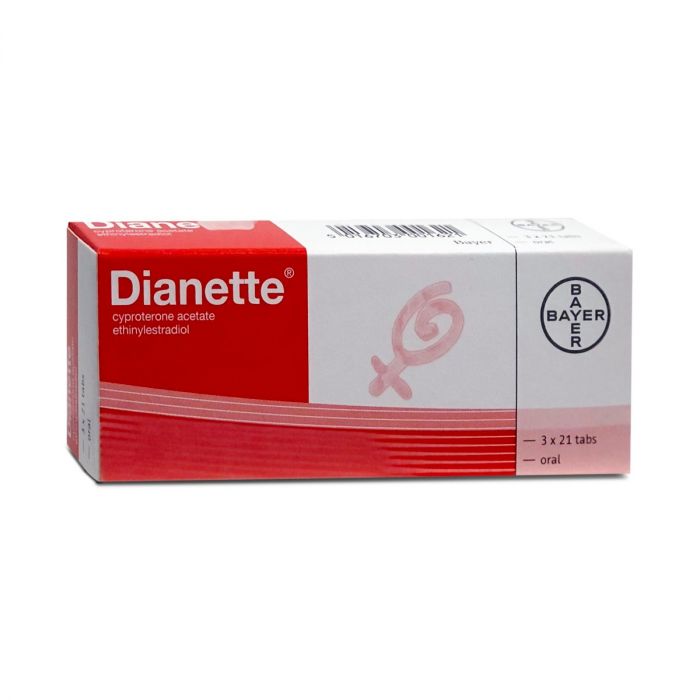Dianette
- Contraceptive Pill used to prevent pregnancy
- Thickens the mucus lining of the womb making it harder for Sperm to enter
- Each pill is marked with a specific day of the week. Take one pill every day for 21 days
sourced in the UK
order before 2pm
UK based pharmacies
-
What is Dianette?
Dianette is a combined contraceptive pill that contains the active ingredients cyproterone acetate and ethinylestradiol.
When taken correctly, the combined contraceptive pill is 99% effective at preventing pregnancy.
You can only Dianette on prescription.
What is Dianette used to treat?
Dianette is a contraception pill used in the prevention of pregnancy. It will not protect you from sexually transmitted diseases (STDs); you should still use a condom to prevent the risk of STDs.
Dianette is also prescribed as a treatment for women who suffer from skin conditions like acne, very oily skin and excessive hair growth. It is normally only prescribed to treat skin conditions when you have not responded to other anti-acne treatments, such as topical creams and antibiotics.
How does Dianette work?
Contraception
Dianette contains the active ingredients cyproterone acetate and ethinylestradiol; this combination is known as co-cyprindiol. Cyproterone acetate is an anti-androgen and ethinylestradiol is a synthetic version of oestrogen. These ingredients work together to prevent pregnancy in three different ways:
- Stopping the ovaries from releasing an egg
- Thickening the mucus in the cervix, making it much harder for sperm to enter the womb
- Preventing the womb lining from thickening enough for an egg to grow within it
Acne
As a treatment for acne, Dianette works to reduce the action of androgens (male sex hormones that stimulate hair and skin growth, as well as oil production). This reduces sebum production and excessive hair growth. You should notice that your skin is less oily after taking this medication for a few weeks, although it can take up to three months for Dianette to take a strong effect.
Who can take Dianette?
Before taking Dianette, you should tell your doctor if you have any illnesses or conditions. Dianette may make some conditions worse.
In particular, you should inform your doctor if:
- You are using any other hormonal contraceptives
- You have or have ever had breast cancer
- You have ever had a heart attack or a stroke
- You have or have had a blood clot in any part of your body
- You have or have ever had any symptoms of a heart attack, stroke, or a mini-stroke
- You have any conditions that may increase the risk of a blood clot in your arteries
- You have very high blood pressure
- You have ever had a severe liver disease
- You have an intolerance to certain sugars
- You have ever had liver tumours or any abnormalities in your liver
- You are allergic to Dianette or any of the ingredients contained in the medication
- Do not use this treatment if you have hepatitis C and are taking any medicines that contain ombitasvir, paritaprevir, ritonavir or dasabuvir.
Some conditions may be made worse by taking Dianette. Inform your doctor if you suffer from any of the below:
- You are overweight (obese)
- You or your family have had heart or circulation problems
- You or your family have ever had blood clotting issues
- You have ever had a migraine or any visual disturbances
- You have porphyria
- You have inflammation of the pancreas
- You have brown patches on your face or body
- You have any illness that was made worse during pregnancy
- You have high levels of fat in your blood
- You have ever suffered from depression
- You have diabetes
Can you buy Dianette over the counter?
You cannot buy Dianette without a prescription, so it is not for sale over the counter.
Can you buy Dianette online in the UK?
Dianette is a prescription-only medicine (POM). You can buy Dianette online from Medicine Direct, but you will need to complete a confidential online questionnaire to make sure it is safe for you. Your answers will be reviewed by one of our certified prescribers.
Dianette alternatives
There are many different types of contraceptive pills available if Dianette is not suitable for you. However, you should always talk to your doctor before switching from one pill to another.
Other combined contraceptive pills that can also be bought from Medicine Direct include:
Alternatively, some women prefer to take progestogen-only pills (POPs), such as Cerazette or Norgeston. These are often referred to as ‘mini-pills’ and can also be ordered from Medicine Direct after completing an online questionnaire.
For more information on different types of contraception that may be suitable for you, we recommend visiting the Contraception Choices website.
-
How to take Dianette
Dianette packs contain either one strip of 21 tablets or three strips of 21 tablets. The strips are marked with a day of the week, indicating which day you should take each pill. Start taking the pill on the correctly marked day.
- Take one pill each day until you have taken all 21 pills.
- After you have taken all 21 pills, you will have a break of seven days where no pills are taken. You will have a bleed similar to a period during this break.
- Start to take the next strip of 21 pills immediately after your seven-day break.
Read the patient information leaflet for full instructions.
-
Dianette Side Effects
If you suffer any worrying or persistent adverse reactions while taking this medication, you should contact your doctor. Dianette side effects include:
- Stomach ache
- Feeling sick
- Weight gain
- Headaches
- Sore or painful breasts
- Depression or mood swings
- Fluid retention
- Migraine
- Decreased sex drive
- Breast enlargement
- Being sick
- Skin rash
For a comprehensive list of side effects, always read the patient information leaflet that will come with Dianette.
Some women have reported severe depression while taking this pill. In some cases, this has been so severe that it has led them to suicidal thoughts. If you experience depression or thoughts of taking your life, you should seek medical attention as soon as possible.
-
Dianette Warnings and Drug Interactions
Before taking any new medication, you should always make sure you inform your doctor of all medicines you are currently using, including prescription and non-prescription medication.
In particular, make sure you tell them if you are taking:
- Medicines to treat epilepsy
- Medicines to treat tuberculosis
- Medicines to treat HIV and hepatitis C
- Medicines to treat fungal infections
- Medicines to treat arthritis or arthrosis
- Medicines to treat high blood pressure in your lungs' blood vessels
- Any herbal remedies containing St. John's Wort
- Any medicines containing ciclosporin
- Tizanidine
- Theophylline
If you are taking Dianette as a skin treatment, you should not take any other hormonal contraception at the same time.
See the NICE website for more information on medicines that interact with Dianette.
Taking contraceptive pills can increase your risk of breast cancer and cervical cancer. You should attend smear tests and cancer screenings regularly.
They can also cause high blood pressure, so you should have this monitored at least annually by your doctor.
Pregnancy and breastfeeding
Do not take Dianette if you are pregnant, think you may be pregnant, or are trying to get pregnant.
Similarly, you should not use Dianette if you are currently breastfeeding.
-
Dianette Ingredients
The main active ingredients within this medicine are: Cyproterone acetate and Ethinylestradiol
For a full list of the inactive ingredients, please read the Summary of Product Characteristics.
-
FAQ
Can you gain weight by taking Dianette?
Gaining weight is a common side effect of taking the pill. Up to 1 in 10 women who take Dianette may experience weight gain. Talk to your doctor if this is a problem. They should also know if you are obese before you start taking it.
Is Yasmin safer than Dianette?
Yasmin and Dianette are both renowned contraceptive pills. However, Yasmin contains a lower dose of oestrogen compared to Dianette, so it is less likely to cause side effects relating to oestrogen.
Can Dianette make you lose your hair?
Dianette is sometimes prescribed for excessive hair growth in women. If you notice that you are losing your hair while taking it as a contraceptive pill, tell your doctor.
Can you take Dianette for acne?
Yes, you can take Dianette for acne, but you should only do so if your doctor has specifically prescribed it for this purpose. Sometimes, the combined contraceptive pill is advised by doctors for people who are suffering from acne.
How long does Dianette take to work?
You will be protected from pregnancy after taking your very first pill if you start to take Dianette on the first day of your period.
How long does Dianette take to work to treat acne?
You should notice an improvement after around three months of taking Dianette for acne.
Can the pill change your personality?
Mood changes have been reported by some women who take the pill. These can include depressed moods or depression. You should tell your doctor if you suffer from any mental health issues, or if you notice mood swings or depressed moods while taking Dianette.
Is taking the pill bad for you?
When taking the contraceptive pill, you are at a higher risk of certain health problems, including blood clots and certain cancers. You should speak to your doctor about the pros and cons before you start to take Dianette or any other form of contraception.
Is it safe to take Dianette for years?
Taking combined oral contraceptive pills such as Dianette can increase your risk of some health problems, such as blood clots and breast cancer. Talk to your doctor about the risks of using the pill long term.
Can my breasts grow from taking the pill?
An uncommon side effect of Dianette is breast enlargement, which may affect up to 1 in 100 people. Talk to your doctor if this bothers you. Do not take Dianette specifically to make your breasts bigger.
Written by: Hussain Abdeh MPharm: 2211840
Updated on: 25/06/2021
This content has been written by Hussain Abdeh and has been medically reviewed by Sonia Khan
Hussain Abdeh
MPharm: 2211840
UK registered pharmacist
How it works - get your medicine in 3 simple steps
- 1 Choose your treatment Select the treatment or medication you need and answer a few questions online regarding your condition.
- 2 Online consultation A UK based doctor registered with the GMC will review your questions and assess your suitability for the medication.
- 3 Receive your delivery If approved, your medication will be dispensed from a UK based pharmacy.




















